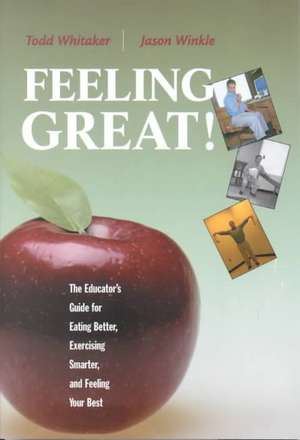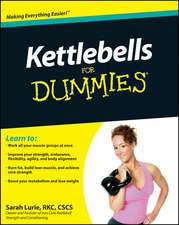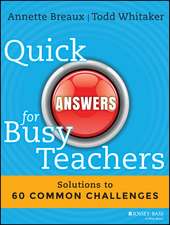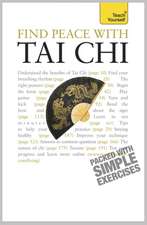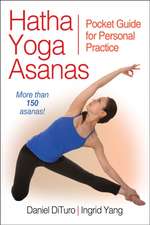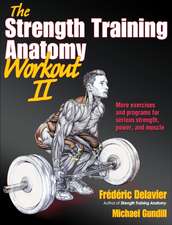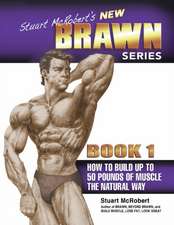Feeling Great: The Educator's Guide for Eating Better, Exercising Smarter, and Feeling Your Best
Autor Todd Whitaker, Jason Winkleen Limba Engleză Paperback – 3 iun 2002
- Make time for exercise in your hectic daily schedule
- Learn how to feel your best every day
- Eat right even when on the go
- Keep your fitness momentum going all year
- Turn your daily routines into healthy habits.
| Toate formatele și edițiile | Preț | Express |
|---|---|---|
| Paperback (1) | 126.66 lei 6-8 săpt. | |
| Taylor & Francis – 3 iun 2002 | 126.66 lei 6-8 săpt. | |
| Hardback (1) | 625.03 lei 6-8 săpt. | |
| Taylor & Francis – 9 aug 2017 | 625.03 lei 6-8 săpt. |
Preț: 126.66 lei
Preț vechi: 153.52 lei
-17% Nou
Puncte Express: 190
Preț estimativ în valută:
24.26€ • 24.99$ • 20.32£
24.26€ • 24.99$ • 20.32£
Carte tipărită la comandă
Livrare economică 22 februarie-08 martie
Preluare comenzi: 021 569.72.76
Specificații
ISBN-13: 9781930556386
ISBN-10: 1930556381
Pagini: 156
Dimensiuni: 152 x 229 x 10 mm
Greutate: 0.27 kg
Ediția:1
Editura: Taylor & Francis
Colecția Routledge
Locul publicării:Oxford, United Kingdom
ISBN-10: 1930556381
Pagini: 156
Dimensiuni: 152 x 229 x 10 mm
Greutate: 0.27 kg
Ediția:1
Editura: Taylor & Francis
Colecția Routledge
Locul publicării:Oxford, United Kingdom
Public țintă
Professional Practice & DevelopmentCuprins
Part 1 WHY SHOULD I BOTHER?; Chapter 1 WHY FITNESS FOR EDUCATORS? WHAT’S SO SPECIAL ABOUT US?; Chapter 2 WHAT, ME A MODEL? NO, A ROLE MODEL!; Part 2 GETTING STARTED; Chapter 3 THAT COOL-OF-THE- EVENING FEELING— REMEMBERING HOW YOU’LL FEEL WHEN YOU ARE DONE, BEFORE YOU EVEN START; Chapter 4 WHAT’S THE BIG DEAL ABOUT FITNESS?; Chapter 5 BUT I DON’T LIKE TO SWEAT .; Part 3 TAKING CONTROL; Chapter 6 IF IT WASN’T GOOD ENOUGH, IT WOULDN’T BE THE MINIMUM–SETTING REALISTIC GOALS; Chapter 7 FINDING THE TIME AND THE ENERGY; Chapter 8 THE 10-MINUTE WORKOUT— THE LITTLE THINGS ADD UP; Chapter 9 KEEPING IT UP THROUGH THE SUMMER; Part 4 FINDING A FIT FOR YOU; Chapter 10 EVERYBODY HAS BEEN ON A DIET — WHAT WILL WORK FOR ME?; Chapter 11 GUIDELINES FOR EATING HEALTHY; Chapter 12 FAD OR FACT? WHAT DIETS REALLY WORK?; Chapter 13 STAYING ON TRACK!; Chapter 14 SUMMING IT ALL UP;
Descriere
Descriere de la o altă ediție sau format:
This special issue of Mathematical Thinking and Learning describes models and modeling perspectives toward mathematics problem solving, learning, and teaching. The concern is not only the mature forms of models and modeling in communities of scientists and mathematicians, but also the need to initiate students in these forms of thought. The contributions of this issue suggest a variety of ways that students (children through adults) can be introduced to highly productive forms of modeling practices. Collectively, they illustrate how modeling activities often lead to remarkable mathematical achievements by students formerly judged to be too young or too lacking in ability for such sophisticated and powerful forms of mathematical thinking. The papers also illustrate how modeling activities often create productive interdisciplinary niches for mathematical thinking, learning, and problem solving that involve simulations of similar situations that occur when mathematics is useful beyond school.
This special issue of Mathematical Thinking and Learning describes models and modeling perspectives toward mathematics problem solving, learning, and teaching. The concern is not only the mature forms of models and modeling in communities of scientists and mathematicians, but also the need to initiate students in these forms of thought. The contributions of this issue suggest a variety of ways that students (children through adults) can be introduced to highly productive forms of modeling practices. Collectively, they illustrate how modeling activities often lead to remarkable mathematical achievements by students formerly judged to be too young or too lacking in ability for such sophisticated and powerful forms of mathematical thinking. The papers also illustrate how modeling activities often create productive interdisciplinary niches for mathematical thinking, learning, and problem solving that involve simulations of similar situations that occur when mathematics is useful beyond school.
